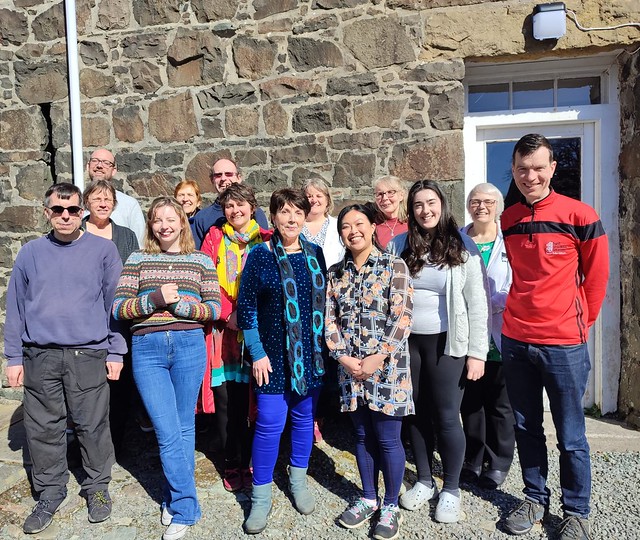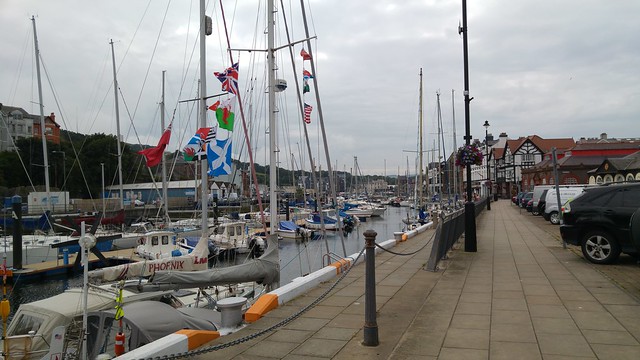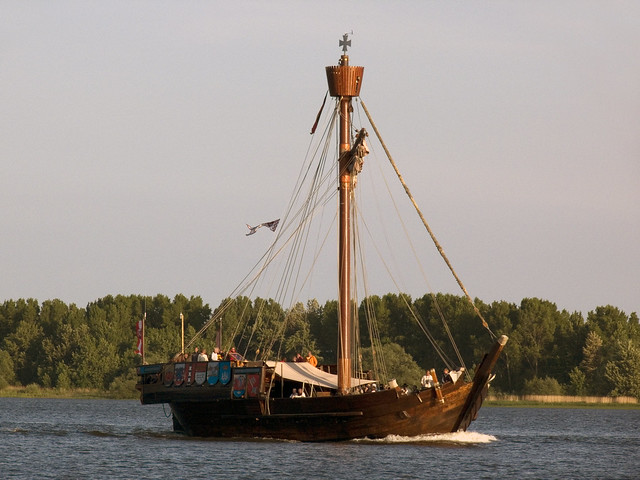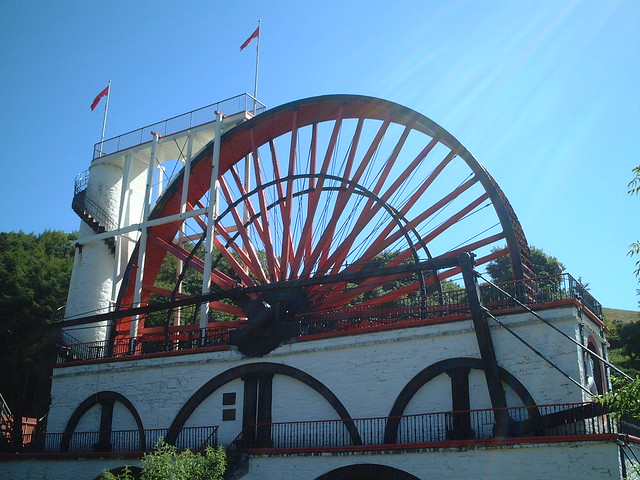Words for with, without, by and related things in Celtic languages.
Words marked with a * are reconstructions.
The emphatic forms of this word combined with personal pronouns are shown after the /.
| Proto-Celtic | *letos = side |
|---|---|
| Old Irish (Goídelc) | la [la] = with, beside, by, belonging to, among; in the language of, in the opinion of lem(m), lim(m), leim, lium(m) / lemsa, li(u)msa = with me lat(t) / latso, latsu = with you (sg) leiss, les(s), lais(s), letha / le(i)som, laisem = with him l(a)ee, lǽ / lési = with her li(u)nn, le(i)nn, linn(a)i = with us lib / libsi = with you (pl) leu, léu leo, lethu / leusom, leosom = with them lam = with my lat = with your (sg) lia = with his/hers/its/their liar = with our lassa = with, which |
| Middle Irish (Gaoidhealg) | la = beside, by, touching, along with, in the same direction as, following to course of, in the company of lem(m), lim(m), lium = with me lat(t), let = with you (sg) leiss, less, les = with him lee, laee, lea = with her lenn, leinn, linn = with us lib = with you (pl) leu, leo = with them |
| Irish (Gaeilge) | le [lʲɛ] = with, to, for, by, against, in proximity to, in contact with, beside, towards, facing, open to, along the face of, in company with, at, against liom / liomsa = with me leat / leatsa = with you (sg) leis / leis-sean = with him léi / léise = with her linn / linne = with us libh / libhse = with you (pl) leo / leosan = with them le mo, lem = with my le do, led = with your (sg) lena = with his/hers/its lenár = with our lena = with their le haghaidh = for, near, in store for |
| Scottish Gaelic (Gàidhlig) | le [le] = with, by, using, in possession of, in favour of, downhill, downstream, lee(ward), port(side) leam / leamsa = with me leat / leatsa = with you (sg) leis / leissan = with him leatha / leathase = with her leinn / leinne = with us leibh / libhse = with you (pl/frm) leotha / leothasan = with them |
| Manx (Gaelg) | lesh [lɛʃ] = for, with, toward lhiam / lhiams = with me lhiat / lhiats = with you (sg) lesh / leshsyn = with him lhee / lheeish = with her lhien / lhienyn = with us lhiu / lhiuish = with you (pl) lhieu / lhieusyn = with them |
Etymology: from Proto-Celtic *letos (side), which is possibly related to *ɸletos (side) [source].
Words for half, side, wide, broad and related things in Celtic languages possibly come from the same roots [more details].
| Proto-Celtic | *writu = against *writbero = to come against, return *writkomfarsko- = to ask *writtongo = to renounce |
|---|---|
| Old Irish (Goídelc) | fri [fʲrʲi] = towards, against, along, beside, close to, on the point of frimm, frium(m) / fri(u)msa = against me frit(t), friut(t) / fritso, fritsu = against you (sg) fris(s) / frissom, frissium = against him frie = against her frinn / finn(a)i = against us frib / fribsi = against you (pl) friu / friusom = against them |
| Middle Irish (Gaoidhealg) | fri = towards, facing, turned to, against, alongside, by, next to, at, in contact with frim(m), frium / fri(u)msa = against me frit(t), friutt / fritsu = against you (sg) fris(s) / frissom = against him frie, friae / frise = against her fri(u)nn, frind / finn(a)i = against us frib, frithib / fribsi = against you (pl) friu / friusom = against them |
| Irish (Gaeilge) | re [rˠeː] = with, to, for, by, against (archaic, le is used instead) fara [ˈfˠaɾˠə] = along, with, beside, in addition to (rare, used in Munster) frae, fré [fˠɾˠeː] = with, along with (used in Connacht) |
| Scottish Gaelic (Gàidhlig) | ri [rʲi] = against, busy with, engaged in, to, than ruim/ ruimsa = against me ruit / riutsa = against you (sg) ris / ris-san = against him rithe / rithese = against her rinn / rinne = against us ribh / ribhse = against you (pl) riutha / riuthasan = against them |
| Manx (Gaelg) | rish [rɪʃ] = along, beside, by, during, for rhym / rhyms = to me rhyt / rhyts = to you (sg) rish / rishyn = to him r’ee / r’eeish = to her rooin / rooinyn = to us riu / riuish = to you (pl) roo / roosyn = to them |
| Old Welsh | gurth = by, at, near |
| Middle Welsh (Kymraec) | wrth, vrth, Ỽrth = by, at, near |
| Welsh (Cymraeg) | (g)wrth [(g)ʊrθ / (g)ʊθ] = by, at, near, close to, opposite, facing, in contact with, on, against, also, with, beside, because of, as a result of, about, concerning wrth angen = according to need, as necessary wrth angor = at anchor wrth fron = near, close to, at the point of, almost wrth law, wrth y llaw = nearby, at hand, by hand wrth fynd heibio = in passing (of comment) wrth ben = on top of, above, over |
| Old Cornish | gurth = by |
| Middle Cornish (Cernewec) | (w)orth = at, by, to, for, with (w)orthyf of/from/to/against me (w)orthys = of/from/to/against thee (w)orto = by/upon him or it (w)orty = by/upon her or it (w)orthyn = of/from/to/against us (w)ortheuch = of/from/to you orte, worté = by/upon them |
| Cornish (Kernewek) | orth = against, at orth ow brys = in my opinion orth bodh ow brys = intentionally orth niver = in number |
| Middle Breton (Brezonec) | oz, ouz, ouc’h, oud = against, to, of, opposite |
| Breton (Brezhoneg) | ouzh [us] = towards, to, against ouzh beg = below, at the bottom (of) diouzh [ˈdiːus/ˈdjuːs] = of, according to diouzh re = in case of need, if necessary diouzhtu [djusˈtyː] = immediately |
Etymology: from Proto-Indo-European *wert- (to turn) [source].
Conjugated forms in Welsh, Cornish and Breton
English words from the same PIE root include divert, invert, pervert, verse, verus, vortex and worth [source].
| Proto-Celtic | *kanta = together with *kantyos = assembly, gathering |
|---|---|
| Gaulish | *kantyos = assembly, gathering cantio = assembly, gathering |
| Old Irish (Goídelc) | cét- = with céite = assembly, hill, mound |
| Middle Irish (Gaoidhealg) | cét- = with céite = hill, mound, open space, racecourse, meeting-place, assembly, square, market-place |
| Old Welsh | cant = by, at, near |
| Middle Welsh (Kymraec) | can, cann, gen, gant, gan = with, together with genhyf = with me genhyt = with thee gant(h)aw = with him or it gent(h)i = with her or it genhym, genhyn, gennyn = with us genhwch, gennwch = with you gantu(d), gantunt, ganthud = with them gid, y gyd, kyd, gyt = with, together with |
| Welsh (Cymraeg) | gan [ɡan] = with, together with, alongside, beside, by (means of), through, because of, on account of, from , of gyda = with, together with, in addition to, in the company of, close by, next to, alongside, besides, for |
| Old Cornish | cant, cans = with, by |
| Middle Cornish (Cernewec) | gan, gans = with, by genef, gynef = with me genes, gynes = with thee ganso = with him or it gynsy = with her or it genen, gynen = with us geneuch = with you gansé = with them |
| Cornish (Kernewek) | gans = by, with gans ganow = by word of mouth gans golow, gans tan = alight, lit gans henna = thereby gans oll ow holon vy = sincerely yours gans pub bolonjedh da = with all good wishes |
| Middle Breton (Brezonec) | gant = with, on the occasion of, so much |
| Breton (Brezhoneg) | gant [ˈɡãnt] = with, because of digant = with, of |
Etymology: from Proto-Indo-European *ḱóm (with) [source].
Conjugated forms in Welsh, Cornish and Breton
| Proto-Celtic | *sekʷo- = besides, without |
|---|---|
| Old Irish (Goídelc) | sech [sʲex] = past, beyond, different from, more than sechum = different from me sechut = different from you (sg) sech(a)e, sechæ = different from him secce = different from her sechund = different from us seccu = different from them |
| Middle Irish (Gaoidhealg) | sech = past, beyond, different from, more than, sechum, seacham , seocham = different from me sechut, seachad, seochad = different from you (sg) (se)chae, secha, sechai = different from him seochu, seacha = different from him secci, seicce, seice = different from her sechund, sechoind, seachoinn = different from us sechaib = different from you (pl) seccu, seocu, seoca = different from them |
| Irish (Gaeilge) | seach [ʃax] = by, past, beyond, other than, more than |
| Scottish Gaelic (Gàidhlig) | seach [ʃɛx] = compared with/to, in preference to, past, by, rather than seach-rathad = bypass, relief road, byway seach-thìm = overtime |
| Manx (Gaelg) | shagh [ʃax] = past shaghey = bye, bygone, past, delay, prolong, neglected shiaghey = past shagh-votal = proxy vote shagh-chlou = offprint shagh-teiyder = proxy |
| Proto-Brythonic | *heb = besides, without |
| Old Welsh | hep = without |
| Middle Welsh (Kymraec) | heb, hep = without, past hebof, hebofy = without me hebot = without thee hebddaw = without him or it hebddi, hebdi, hebti = without her or it hebom, heibom = without us heboch = without you hebddudd = without them heb law, hebillaw, heb-law = besides, not counting eb vn ail = without peer, incomparable, unrivalled heb annot = without delay, immediately |
| Welsh (Cymraeg) | heb [hɛb/heːb] = without, minus, free from, void of, lacking, in the absence of, past, besides, in addition to, not including, excluding, apart from, heblaw = besides, not counting, over and above, in addition to, except, but, without, past heb ei ail, heb (un) ail = without peer, incomparable, unrivalled heb annod = without delay, immediately |
| Middle Cornish (Cernewec) | heb, hep = without, destitute, void of hebford = without a road |
| Cornish (Kernewek) | heb = witout heb ahwer = readily heb bri = irrelevant heb danjer = safely heb difuna = dormant heb diwedh = endlessly, continuously, eternal |
| Old Breton | ep = without |
| Middle Breton (Brezonec) | hep, hemp, eb = without hep quen, ep quen, hemb kin, epken = only hep muy, hep-mui = without further …, only hep muy quen, hep mui quen = only |
| Breton (Brezhoneg) | hep [hep] = without hepken = only, exclusiveness hepmuiken = without further … |
Etymology: from Proto-Indo-European *sekʷ- (to follow) or from *sek- (to cut) [source].
Conjugated forms in Welsh, Cornish and Breton
English words from the same PIE root include sect, sign, signal, social, sue, suit, suite [source].
| Proto-Celtic | *kina = on this side of |
|---|---|
| Old Irish (Goídelc) | cen [kʲen] = except, without, unbeknownst to, unknown to cene, cenae [ˈkʲene] = besides, in any case, already olchene, olchenae [olˈxʲene] = besides, the other(s), the rest |
| Middle Irish (Gaoidhealg) | cen, cin, can, gen, gin, gan = on this side of, apart from, besides, except, without, -less |
| Irish (Gaeilge) | gan [ɡən̪ˠ/ɡan̪ˠ] = without, not gan amhras = undoubtedly gan fáth gan ábhar = for no reason whatever gan fhios = unknown, secretly gan on = faultless, unblemished |
| Scottish Gaelic (Gàidhlig) | gun [ɡən̪ˠ] = without, not gun chiall = without sense, senseless, insane gun fhiù = worthless, trashy, trivial gun iarraidh = unwanted, unbidden, unsought gun mhaille = forthwith gun sgot = clueless |
| Manx (Gaelg) | gyn = ex, un-, devoid, without gyn baare = pointless gyn bun = baseless, bogus, unfounded gyn currym = carefree, unencumbered gyn ennym = anonymous, nameless, unnamed gyn feill = vegetarian |
| Middle Breton (Brezonec) | quen, quin, gen, ken = no more, other |
| Breton (Brezhoneg) | ken [ˈkɛnː] = other, only, no more |
Etymology: from Proto-Indo-European *ḱe (this, here) [source].
Words marked with a * are reconstructions.
Sources: Wiktionary, Am Faclair Beag, Online Manx Dictionary, Teanglann.ie, eDIL – Electronic Dictionary of the Irish Language, In Dúil Bélrai English – Old Irish glossary, Geiriadur Prifysgol Cymru, Gerlyver Kernewek, Dictionaire Favereau, TermOfis, English – ProtoCeltic WordList (PDF), Etymological Dictionary Of Proto Celtic












